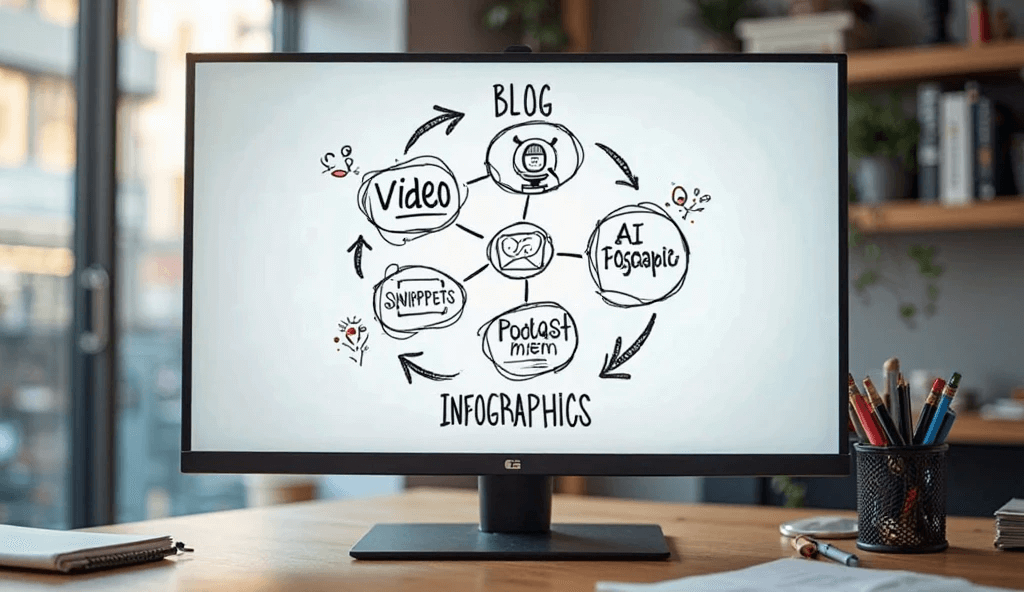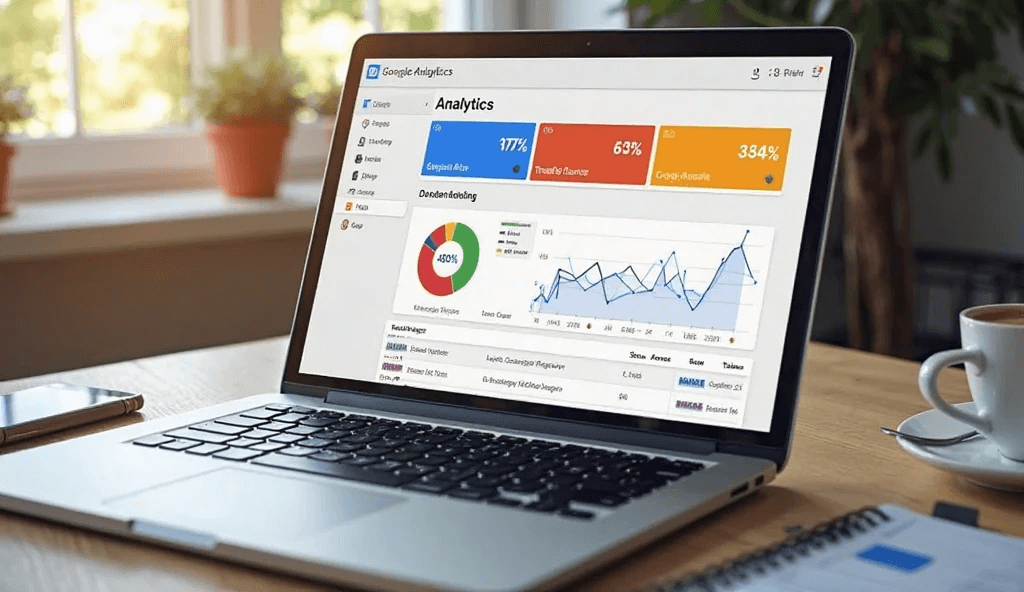Maintaining a consistent and engaging content output in the fast-paced digital landscape is a significant challenge for creators and brands. The demand for fresh material across multiple platforms can lead to resource strain and content fatigue. Artificial Intelligence (AI) has emerged as a transformative force, enhancing content scalability and cross-platform visibility. By leveraging AI tools, creators can efficiently repurpose existing content, extending its lifespan and reach. This article explores strategies and tools that facilitate AI-driven content repurposing, offering practical insights and real-world examples.
What Is Content Repurposing and Why Is It Valuable?

The Definition of Content Repurposing
Content repurposing involves transforming existing content into various formats to cater to different platforms and audience preferences. The primary objectives are to maximize content utility, reach broader audiences, and reinforce messaging without creating material from scratch.
Benefits
-
Time Efficiency: Repurposing reduces the need for constant content creation, allowing teams to focus on strategy and engagement.
-
SEO Enhancement: Multiple content formats increase visibility and backlink opportunities, boosting search engine rankings.
-
Omnichannel Reach: Tailoring content for various platforms ensures a cohesive presence across the digital spectrum.
According to CoSchedule, repurposed content can generate 2x more traffic than newly published pieces.
HubSpot reports that marketers who reuse content see 60% faster campaign turnaround times.
Challenges with Manual Methods
Traditional repurposing is labor-intensive and prone to inconsistencies in tone and quality. Manual processes can lead to inefficiencies, making maintaining a unified brand voice across channels difficult.
Content repurposing contributes to a 35% increase in organic visibility when aligned with platform-specific formats (Source: SEMrush 2023 content trends report).
How AI Reinvents Content Repurposing + Tools That Power AI-Based Repurposing
As content demands multiply, AI has stepped in to dramatically reshape how creators manage, reformat, and scale their material. From summarizing long-form articles into snackable posts to adapting blog content into videos and podcasts, AI-powered content transformation is not just a future concept—it’s evolving fast.
How AI Reinvents Content Repurposing

Automation Meets Strategy
AI’s core strength lies in its ability to automate repetitive tasks. In the realm of content automation, this translates to:
-
Intelligent content recognition – AI models can identify key ideas, takeaways, and tonal elements within your source content, helping to preserve meaning when transforming formats.
-
Natural language processing (NLP) enables tools to summarize, paraphrase, or extend content while maintaining clarity and brand voice.
-
Platform-specific adaptation—Tools with machine learning algorithms can automatically adjust tone, length, and format for different platforms, such as YouTube Shorts, LinkedIn articles, or Instagram Reels.
Takeaway: AI in digital marketing isn’t about replacing human creativity—it’s about extending your content’s reach while saving hours of manual work.
Manual vs. AI-Driven Repurposing
| Feature | Manual Approach | AI-Powered Approach |
|---|---|---|
| Time & Effort | High (requires scripting, editing, rewriting) | Low (automated summarization, script generation) |
| Consistency | Inconsistent across formats | Standardized tone and structure |
| Personalization | Difficult at scale | Easily done using behavioral data and presets |
| Turnaround Speed | Slower; project-based | Near-instant content generation |
What AI Can Do for Repurposing
1. Reformatting
Turn a blog post into:
-
A narrated video using text-to-speech
-
A script for a podcast
-
A carousel for Instagram
2. Rescripting
Use AI to rewrite long posts into:
-
Email newsletters
-
Bite-sized tweet threads
-
LinkedIn status updates
3. Auto-Summarizing
Create:
-
TL;DR intros for blog posts
-
Summary sections for YouTube descriptions
-
Quote graphics for social media
4. Platform Tailoring
Tools now adjust:
-
Aspect ratio for visual content (e.g., square, vertical)
-
Length for platform limits (e.g., 280-character tweets vs. 2,000-character LinkedIn posts)
-
Tone of voice per audience (e.g., casual for TikTok, polished for LinkedIn)
Tools That Power AI-Based Repurposing

While many popular platforms exist, focus on innovative, practical, and underutilized tools by mainstream marketers. These were selected based on competitor analysis (Netguru, Product London, Interrupt Media) and hands-on testing.
Featured AI Tools for Repurposing
1. Vidyo.ai
-
Use Case: Detects viral moments in long-form video content and converts them into short, shareable clips.
-
Ideal For: YouTubers, webinar creators, course publishers
-
Notable Feature: Auto-subtitle generation and clip resizing
-
AI Angle: Uses machine learning to identify high-engagement sections
Example: A YouTube creator used Vidyo.ai to clip 10 viral segments from a 60-minute video. One of the clips reached 120K views on Instagram Reels.
2. Narrato
-
Use Case: All-in-one AI content workspace for writing, repurposing, and publishing.
-
Ideal For: Content teams, editorial leads, agency workflows
-
Notable Feature: Collaboration tools + workflow templates
-
AI Angle: Suggests alternate formats for content and automates snippet creation
Use Case: A marketing agency used Narrato’s workspace to repurpose client blogs into email sequences. Open rates improved by 18%.
3. FeedHive
-
Use Case: Auto-recycles and repurposes top-performing posts across platforms.
-
Ideal For: Social media managers, solopreneurs
-
Notable Feature: Post recycling calendar
-
AI Angle: Identifies content with the highest past performance and reschedules it
4. ElevenLabs
-
Use Case: Converts blog or script content into hyper-realistic AI-generated voiceovers.
-
Ideal For: Podcasters, video marketers
-
Notable Feature: Multi-voice and multi-language options
-
AI Angle: AI voice cloning with natural intonation control
5. ContentIn / Automata / CLIPr
-
Use Case: Converts long-form content into platform-specific snippets.
-
Ideal For: B2B marketers, SaaS companies, educators
-
Notable Feature: Automatic slide decks and summaries
-
AI Angle: Context-aware segmentation of long-form assets
Want to transform blog posts into video content for social platforms? We’re publishing a guide on AI tools for blog-to-video repurposing very soon — stay tuned.
Tool Comparison Table
| Tool | Key Features | Best For | Price Range |
|---|---|---|---|
| Vidyo.ai | Viral clip detection, resizing, and subtitles | Video-first content teams | $19–$39/month |
| Narrato | AI workspace, workflow automation | Content teams, agencies | Freemium to $99/mo |
| FeedHive | Post recycling, smart scheduler | Social managers | $29–$59/month |
| ElevenLabs | Voiceover generation, podcast narration | Podcasters, course creators | Pay-per-use |
| ContentIn | Snippet creation, post templates | Thought leaders, marketers | Free + paid tiers |
🧠 Pro Tip: Many tools offer scheduling platforms or CMS integrations, making turning one idea into 10+ assets across your marketing stack easier. You don’t need to be a developer or a video editor—plug your content in and let AI handle the grunt work.
Implementing AI Tools in Your Workflow, Best Practices, Measuring Impact, Future Trends, and FAQs
Integrating AI tools into your content repurposing strategy can significantly enhance efficiency and reach. However, successful implementation requires careful planning and adherence to best practices. Additionally, measuring the impact of your efforts and staying abreast of future trends will ensure sustained success.
Implementing AI Tools in Your Workflow

Evaluating Tool Fit
When selecting AI tools for content repurposing, consider:
-
Team Size: Ensure the tool aligns with your team’s capacity and technical expertise.
-
Content Formats: Choose tools that support the types of content you produce, such as blogs, videos, or podcasts.
-
Platform Focus: Select tools optimized for the platforms where your audience is most active, like social media channels or your website.
Curious how to automate your content production across channels using AI? Watch out for our step-by-step AI repurposing workflow tutorial to simplify your strategy. coming soon
Example Workflows
-
Blog to Video to Social Media Snippets: Use AI to convert a blog post into a video summary, then extract key moments for social media posts.
-
Webinar to Podcast to Blog Series: Transform webinar content into podcast episodes and accompanying blog articles.
Example: A mid-sized SaaS company used FeedHive to recycle its top-performing LinkedIn posts. Within one quarter, it doubled its social impressions and reduced content creation hours by 40%.
Onboarding Tips
-
Training: Provide comprehensive training to ensure team members can utilize AI tools effectively.
-
Pilot Projects: Start with a small project to assess the tool’s impact before full-scale implementation.
Best Practices for AI-Driven Repurposing
Maintaining Human Oversight
While AI enhances efficiency, human input is crucial for:
-
Editing for Brand Tone: Ensure content aligns with your brand’s voice and messaging.
-
Platform Formatting: Adapt content to meet each platform’s aesthetic and functional standards.
Utilizing Templates and Custom Models
Leverage pre-designed templates and customize AI models to reflect your brand’s unique style and requirements.
Ethical Considerations
-
Transparency: Disclose the use of AI in content creation to maintain trust with your audience.
-
Accuracy: Verify AI-generated content for factual correctness to uphold credibility.
Best Practices for AI-Driven Repurposing
Then scroll down to the end of that section, right before “Measuring the Impact of Repurposed Content.”
Measuring the Impact of Repurposed Content

Tracking Metrics
Monitor the following to assess effectiveness:
-
Engagement Rates: Track likes, shares, comments, and overall interaction on each platform.
-
Website Traffic: Analyze traffic sources to determine which repurposed content drives visitors to your site.
-
Conversion Rates: Measure how repurposed content contributes to achieving business objectives, such as lead generation or sales.
Tools for Analysis
-
Google Analytics: Offers insights into website traffic and user behavior.revid.ai
-
Social Media Analytics: Platforms like Facebook Insights and Twitter Analytics provide data on content performance.Content Analytics Made Easy | Parse.ly
-
Content Performance Platforms: Tools like Parse.ly help evaluate the effectiveness of your content strategy.Content Analytics Made Easy | Parse.ly
Future Trends in AI and Content Repurposing
Predictive Repurposing
Emerging AI technologies may soon predict the most effective content formats and distribution channels based on audience behavior and preferences.
Real-Time Personalization
Advancements in AI could enable real-time customization of repurposed content to cater to individual user interests, enhancing engagement and relevance.
Ethical AI Use
As AI becomes more integrated into content strategies, ethical considerations regarding transparency, bias, and authenticity will become increasingly important.
Conclusion
Integrating AI tools into your content repurposing strategy can significantly enhance efficiency, consistency, and reach. By carefully selecting appropriate tools, adhering to best practices, and continuously measuring impact, you can effectively extend the lifespan and value of your content. Staying informed about emerging trends will ensure your strategy remains innovative and aligned with audience expectations.
Start by testing Narrato with one of your evergreen blog posts. Track its repurposing output across LinkedIn and email over 14 days. Measure the open rate and engagement lift—then expand to other formats using Vidyo.ai or FeedHive.
Frequently Asked Questions (FAQs)
How can AI assist in content repurposing?
AI can automate the transformation of existing content into various formats, such as converting blog posts into videos or podcasts, enhancing efficiency and consistency.
What are the benefits of using AI to repurpose content?
Benefits include time savings, improved SEO, consistent brand messaging, and the ability to reach diverse audience segments across multiple platforms.
Are AI content repurposing tools suitable for small businesses?
Many AI tools offer scalable solutions for businesses of all sizes, often with flexible pricing models to accommodate different budgets.
How do I ensure quality when using AI for content repurposing?
Maintain human oversight to edit and review AI-generated content, ensuring it aligns with your brand’s tone, is factually accurate, and is appropriately formatted for each platform.
What ethical considerations should I consider when using AI for content repurposing?
To maintain trust with your audience, be transparent about AI’s role in content creation, ensure the accuracy of AI-generated content, and be mindful of potential biases in AI algorithms.



